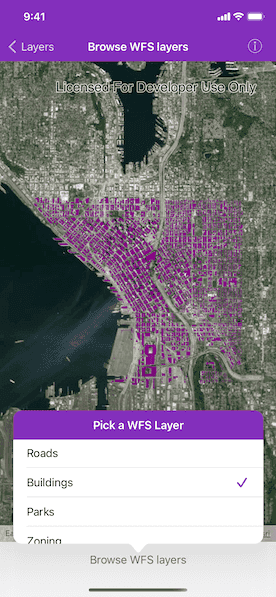Browse a WFS service for layers and add them to the map.

Use case
Services often have multiple layers available for display. For example, a feature service for a city might have layers representing roads, land masses, building footprints, parks, and facilities. A user can choose to only show the road network and parks for a park accessibility analysis.
How to use the sample
Use the bottom button to select a layer from the list to display it on the map.
Some WFS services return coordinates in X,Y order, while others return coordinates in lat/long (Y,X) order. If you don't see features rendered or you see features in the wrong location, use the swap switch to change the coordinate order and reload.
How it works
- Create an instance of
AGSWFSServicewith a URL to a WFS feature service. - Obtain a list of
AGSWFSLayerInfoobjects fromAGSWFSService.serviceInfo. - When a layer is selected, create an instance of
AGSWFSFeatureTablefrom theAGSWFSLayerInfoobject.- Set the axis order if necessary.
- Create a feature layer from the feature table.
- Add the feature layer to the map.
- The sample uses randomly-generated symbology, similar to the behavior in ArcGIS Pro.
Relevant API
- AGSFeatureLayer
- AGSWFSFeatureTable
- AGSWFSFeatureTable.axisOrder
- AGSWGSLayerInfo
- AGSWGSService
- AGSWGSServiceInfo
About the data
The sample is configured with a sample WFS service, but you can load other WFS services if desired. The default service shows Seattle downtown features hosted on ArcGIS Online.
Tags
browse, catalog, feature, layers, OGC, service, web, WFS
Sample Code
// Copyright 2019 Esri.
//
// Licensed under the Apache License, Version 2.0 (the "License");
// you may not use this file except in compliance with the License.
// You may obtain a copy of the License at
//
// http://www.apache.org/licenses/LICENSE-2.0
//
// Unless required by applicable law or agreed to in writing, software
// distributed under the License is distributed on an "AS IS" BASIS,
// WITHOUT WARRANTIES OR CONDITIONS OF ANY KIND, either express or implied.
// See the License for the specific language governing permissions and
// limitations under the License.
import UIKit
import ArcGIS
class BrowseWFSLayersViewController: UIViewController {
@IBOutlet private weak var mapView: AGSMapView!
@IBOutlet weak var browseButton: UIBarButtonItem!
private var wfsService: AGSWFSService!
private var wfsServiceInfo: AGSWFSServiceInfo?
// Layer Info for the layer that is currently drawn on map view.
private var displayedLayerInfo: AGSWFSLayerInfo? {
let selectedLayerInfo = ((mapView?.map?.operationalLayers.firstObject as? AGSFeatureLayer)?.featureTable as? AGSWFSFeatureTable)?.layerInfo
return selectedLayerInfo
}
override func viewDidLoad() {
super.viewDidLoad()
// Initialize a map with an imagery basemap
let map = AGSMap(basemapStyle: .arcGISImageryStandard)
// Assign map to the map view
mapView.map = map
// A URL to the GetCapabilities endpoint of a WFS service
let wfsServiceURL = URL(string: "https://dservices2.arcgis.com/ZQgQTuoyBrtmoGdP/arcgis/services/Seattle_Downtown_Features/WFSServer?service=wfs&request=getcapabilities")!
// Create and load a WFS Service, to access the service information
self.wfsService = AGSWFSService(url: wfsServiceURL)
self.wfsService.load { [weak self] (error) in
guard let self = self else { return }
if let error = error {
self.presentAlert(message: "Failed to load WFS layer: \(error.localizedDescription)")
} else if let serviceInfo = self.wfsService.serviceInfo {
self.wfsServiceInfo = serviceInfo
self.browseButton.isEnabled = true
}
}
// Add the source code button item to the right of navigation bar
(navigationItem.rightBarButtonItem as! SourceCodeBarButtonItem).filenames = [
"BrowseWFSLayersViewController",
"WFSLayersTableViewController"
]
}
// MARK: - Navigation
override func prepare(for segue: UIStoryboardSegue, sender: Any?) {
if let navController = segue.destination as? UINavigationController,
let controller = navController.viewControllers.first as? WFSLayersTableViewController {
controller.mapView = mapView
controller.allLayerInfos = (self.wfsServiceInfo?.layerInfos)!
controller.selectedLayerInfo = displayedLayerInfo
navController.presentationController?.delegate = self
controller.preferredContentSize = {
let height: CGFloat
if traitCollection.horizontalSizeClass == .regular,
traitCollection.verticalSizeClass == .regular {
height = 200
} else {
height = 150
}
return CGSize(width: 375, height: height)
}()
}
}
}
extension BrowseWFSLayersViewController: UIAdaptivePresentationControllerDelegate {
func adaptivePresentationStyle(for controller: UIPresentationController, traitCollection: UITraitCollection) -> UIModalPresentationStyle {
return .none
}
}